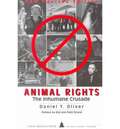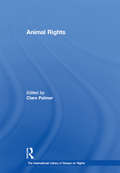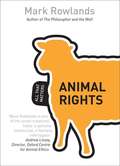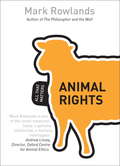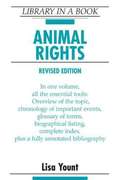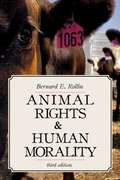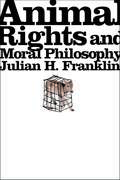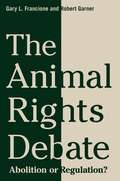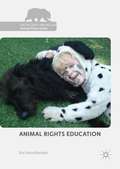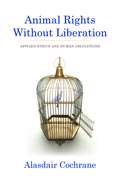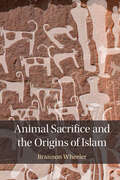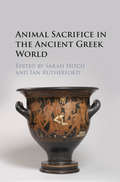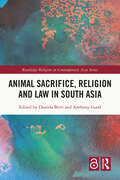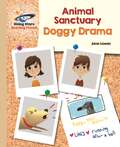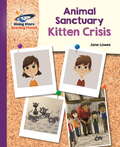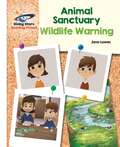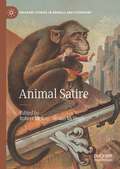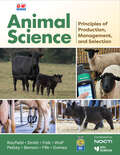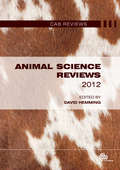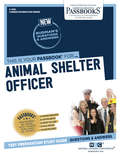- Table View
- List View
Animal Rights: the Inhumane Crusade
by Daniel T. OliverA thorough-going discussion and analysis of the animal rights movement, including history, philosophy and tactics. Contains dosiers of prominant figures as well as organizations. Chapter footnotes and bibliography are also included.
Animal Rights (The International Library of Essays on Rights)
by Clare PalmerDo animals have moral rights? If so, which ones? How does this affect our thinking about agriculture and experimentation? If animals have moral rights, should they be protected by law? These are some of the questions addressed in this collection, which contains more than 30 papers spanning nearly 40 years of debates about animal rights. It includes work by leading advocates of animal rights both in philosophy and law, as well as contributions by those resolutely opposed to the very idea of animal rights. A substantial Introduction surveys key arguments in the area and puts the papers in context.
Animal Rights
by Mark RowlandsAnimal Rights is a big deal. From animal testing to vegetarianism, and hunting to preservation of fish stocks, it's a topic that's always in the news. Mark Rowlands, author of The Philosopher and the Wolf, is the world's best known philosopher of animal rights. In this, the first introduction he has written to the topic, he starts by asking whether there is anything about humans that makes us psychologically or physiologically distinctive - so that there might be a moral justification for treating animals in a different way to how we treat humans. From this foundation, he goes on to explore specific issues of eating animals, experimentation, pets, hunting, zoos, predation and engineering animals. He ends with a challenging argument of how an improved understanding of animal ethics can and should affect readers' choices.
Animal Rights: All That Matters
by Mark RowlandsAnimal Rights is a big deal. From animal testing to vegetarianism, and hunting to preservation of fish stocks, it's a topic that's always in the news. Mark Rowlands, author of The Philosopher and the Wolf, is the world's best known philosopher of animal rights. In this, the first introduction he has written to the topic, he starts by asking whether there is anything about humans that makes us psychologically or physiologically distinctive - so that there might be a moral justification for treating animals in a different way to how we treat humans. From this foundation, he goes on to explore specific issues of eating animals, experimentation, pets, hunting, zoos, predation and engineering animals. He ends with a challenging argument of how an improved understanding of animal ethics can and should affect readers' choices.
Animal Rights: A Reference Handbook
by Clifford J. SherryReviews the issues surrounding animal rights, including experimentation and animal harvesting. Presents the history of the issue, significant federal legislation, and arguments of activists on both sides of the debate. Includes biographical sketches and extensive annotated listings of organizations and print and nonprint resources.
Animal Rights
by Lisa YountAfter summarizing the issues involved in animal welfare and rights and the applicable laws, the author provides a chronology of the movement, profiles of important figures, a glossary without pronunciation guides, advice on research, an annotated bibliography, a list of organizations and agencies, texts of bills and decisions, and tables and graphs. Annotation ©2004 Book News, Inc., Portland, OR (booknews.com)
Animal Rights: All That Matters (All That Matters)
by Mark RowlandsAnimal Rights is a big deal. From animal testing to vegetarianism, and hunting to preservation of fish stocks, it's a topic that's always in the news. Mark Rowlands, author of The Philosopher and the Wolf, is the world's best known philosopher of animal rights. In this, the first introduction he has written to the topic, he starts by asking whether there is anything about humans that makes us psychologically or physiologically distinctive - so that there might be a moral justification for treating animals in a different way to how we treat humans. From this foundation, he goes on to explore specific issues of eating animals, experimentation, pets, hunting, zoos, predation and engineering animals. He ends with a challenging argument of how an improved understanding of animal ethics can and should affect readers' choices.
Animal Rights And Human Morality (Third Edition)
by Bernard E. RollinIt's been more than two decades since the first edition of this landmark book garnered public accolades for its sensitive yet honest and forthright approach to the many disquieting questions surrounding the emotional debate over animal rights. Is moral concern something owed by human beings only to human beings? <p><p> Drawing upon his philosophical expertise, his extensive experience of working with animal issues all over the world, and his knowledge of biological science, Bernard E. Rollin -- now widely recognized as the father of veterinary ethics -- develops a compelling analysis of animal rights as it is emerging in society. The result is a sound basis for rational discussion and social policy development in this area of rapidly growing concern. He believes that society must elevate the moral status of animals and protect their rights as determined by their natures. His public speaking and published works have contributed to passage of major federal legislation designed to increase the well-being of laboratory animals. <p> This new third edition is greatly expanded and includes a new chapter on animal agriculture, plus additional discussions of animal law, companion animal issues, genetic engineering, animal pain, animal research, and many other topics.
Animal Rights and Moral Philosophy
by Julian H. FranklinAnimals obviously cannot have a right of free speech or a right to vote because they lack the relevant capacities. But their right to life and to be free of exploitation is no less fundamental than the corresponding right of humans, writes Julian H. Franklin. This theoretically rigorous book will reassure the committed, help the uncertain to decide, and arm the polemicist.Franklin examines all the major arguments for animal rights proposed to date and extends the philosophy in new directions. <P><P>Animal Rights and Moral Philosophy begins by considering the utilitarian argument of equal respect for animals advocated by Peter Singer and, even more favorably, the rights approach that has been advanced by Tom Regan. Despite their merits, both are found wanting as theoretical foundations for animal rights. Franklin also examines the ecofeminist argument for an ethics of care and several rationalist arguments before concluding that Kant's categorical imperative can be expanded to form a basis for an ethical system that includes all sentient beings. Franklin also discusses compassion as applied to animals, encompassing Albert Schweitzer's ethics of reverence for life. He concludes his analysis by considering conflicts of rights between animals and humans.
The Animal Rights Debate: Abolition or Regulation? (Critical Perspectives on Animals: Theory, Culture, Science, and Law)
by Gary Francione Robert GarnerGary L. Francione is a law professor and leading philosopher of animal rights theory. Robert Garner is a political theorist specializing in the philosophy and politics of animal protection. Francione maintains that we have no moral justification for using nonhumans and argues that because animals are property-or economic commodities-laws or industry practices requiring "humane" treatment will, as a general matter, fail to provide any meaningful level of protection. <P><P> Garner favors a version of animal rights that focuses on eliminating animal suffering and adopts a protectionist approach, maintaining that although the traditional animal-welfare ethic is philosophically flawed, it can contribute strategically to the achievement of animal-rights ends. As they spar, Francione and Garner deconstruct the animal protection movement in the United States, the United Kingdom, Europe, and elsewhere, discussing the practices of such organizations as PETA, which joins with McDonald's and other animal users to "improve" the slaughter of animals. They also examine American and European laws and campaigns from both the rights and welfare perspectives, identifying weaknesses and strengths that give shape to future legislation and action.
Animal Rights Education (The\palgrave Macmillan Animal Ethics Ser. )
by Kai HorsthemkeThis book explores how the ethical treatment and status of other-than-human animals influence pedagogy, teaching, and learning in general, aiming to fill what has been a gap in the philosophy of education. It examines key trends in this regard, including environmental education, humane education, posthumanist education, ecopedagogy, critical animal pedagogy, critical animal studies, animal standpoint theory, and vegan education. The book discusses animal minds and interests, and how animals have been accommodated in moral theory. Further, it investigates whether anti-racist and anti-sexist education logically entail anti-speciesist education and closes by proposing animal rights education as a viable and sound alternative, a pedagogy that does justice not only to animals in general and as species, but also to individual animals. If animal rights education is philosophically and educationally meaningful, then it can arguably offer a powerful pedagogical tool, and facilitate lasting pro-animal changes.
Animal Rights Without Liberation: Applied Ethics and Human Obligations (Critical Perspectives on Animals: Theory, Culture, Science, and Law)
by Alasdair CochraneAlasdair Cochrane introduces an entirely new theory of animal rights grounded in their interests as sentient beings. He then applies this theory to different and underexplored policy areas, such as genetic engineering, pet-keeping, indigenous hunting, and religious slaughter. In contrast to other proponents of animal rights, Cochrane claims that because most sentient animals are not autonomous agents, they have no intrinsic interest in liberty. As such, he argues that our obligations to animals lie in ending practices that cause their suffering and death and do not require the liberation of animals. Cochrane's "interest-based rights approach" weighs the interests of animals to determine which is sufficient to impose strict duties on humans. In so doing, Cochrane acknowledges that sentient animals have a clear and discernable right not to be made to suffer and not to be killed, but he argues that they do not have a prima facie right to liberty. Because most animals possess no interest in leading freely chosen lives, humans have no moral obligation to liberate them. Moving beyond theory to the practical aspects of applied ethics, this pragmatic volume provides much-needed perspective on the realities and responsibilities of the human-animal relationship.
Animal Rights Without Liberation: Applied Ethics and Human Obligations
by Alasdair CochraneThrough its emphasis on meeting learning objectives, the Task-Centered Model for Educational Supervision (TCS) accommodates new models of field instruction in social work, teaching accountability in fieldwork supervision and instructing novice social workers in how to be self-initiating and evaluative. The application of the TCS model in various real-life education and practice environments is illustrated by detailed case vignettes throughout the book.
Animal Sacrifice and the Origins of Islam
by Brannon WheelerIslam is the only biblical religion that still practices animal sacrifice. Indeed, every year more than a million animals are shipped to Mecca from all over the world to be slaughtered during the Muslim Hajj. This multi-disciplinary volume is the first to examine the physical foundations of this practice and the significance of the ritual. Brannon Wheeler uses both textual analysis and various types of material evidence to gain insight into the role of animal sacrifice in Islam. He provides a 'thick description' of the elaborate camel sacrifice performed by Muhammad, which serves as the model for future Hajj sacrifices. Wheeler integrates biblical and classical Arabic sources with evidence from zooarchaeology and the rock art of ancient Arabia to gain insight into an event that reportedly occurred 1400 years ago. His book encourages a more nuanced and expansive conception of “sacrifice” in the history of religion.
Animal Sacrifice in the Ancient Greek World
by Sarah Hitch Ian RutherfordThis volume brings together studies on Greek animal sacrifice by foremost experts in Greek language, literature and material culture. Readers will benefit from the synthesis of new evidence and approaches with a re-evaluation of twentieth-century theories on sacrifice. The chapters range across the whole of antiquity and go beyond the Greek world to consider possible influences in Hittite Anatolia and Egypt, while an introduction to the burgeoning science of osteo-archaeology is provided. The twentieth-century emphasis on sacrifice as part of the Classical Greek polis system is challenged through consideration of various ancient perspectives on sacrifice as distinct from specific political or even Greek contexts. Many previously unexplored topics are covered, particularly the type of animals sacrificed and the spectrum of sacrificial ritual, from libations to lasting memorials of the ritual in art.
Animal Sacrifice, Religion and Law in South Asia (Routledge Religion in Contemporary Asia Series)
by Daniela Berti Anthony GoodThis book presents original research on the controversies surrounding animal sacrifice in South Asia through the lens of court cases. It focuses on the parties involved in these cases: on their discourses, motivations, and contrasting points of view. Through an examination of judicial files, court decisions and newspaper articles, and interviews with protagonists, the book explores how the question of animal sacrifice is dealt with through administrative, legislative, and judicial practice. It outlines how, although animal sacrifice has over the ages been contested by various religious reform movements, the practice has remained widespread at all levels of society, especially in certain regions. It reveals that far from merely being a religious and ritual question, animal sacrifice has become a focus of broader public debate, and it discusses how the controversies highlight the contrast between ‘traditional’ and ‘reformist’ understandings of Hinduism; the conflict between the core legal and moral principles of religious freedom and social progress; and the growing concern with environmental issues and animal rights.
Animal Satire (Palgrave Studies in Animals and Literature)
by Robert McKay Susan McHughAnimal Satire presents a cultural history of animal satire, a critically neglected but persistent presence in the history of cultural production, in which animals expose human folly while the strategies of satire expose the folly of human-animal relations. Highlighting the teeming animal presences across the history of satirical expression from Aristophanes to Twitter, with chapters on key works of literature, drama, film, and a plethora of satirical media, Animal Satire reveals the rich rhetorical significance of animality in powering the politics of satire from ancient and medieval through modern and contemporary times. More pressingly, the book makes the case for the significance of satire for understanding the real-world implications of rhetoric about animals in ongoing struggles for justice. By gathering both critical and creative examples from representative media forms, historical periods, and continents, this volume aims to enrich scholarship on the history of satire as well as empower creative practitioners with ideas about its practical applications today.
Animal Science: Principles Of Production, Management, And Selection
by John S. Rayfield Kasee L. Smith Jeremy Falk Kattlyn Wolf Allen Pettey Drew Parks Benson Jessica Fife Noe Alberto GomezAnimal Science: Principles of Production, Management, and Selection introduces students to the important scientific and applied concepts within the global and domestic animal industries. Serving as an in-depth and hands-on resource for animal science courses, it begins by covering the basics of animal science, including careers, anatomy and physiology, animal health and nutrition, genetics, reproduction, scientific methods, products, and by-products, as well as current issues facing animal scientists. It proceeds with animal-specific sections on beef cattle, swine, sheep, goats, dairy cattle, equine, poultry, and companion animals, each with chapters covering the industry, production, management and care, selection and evaluation, and classification and breeds. Written by an outstanding team of authors who are all current educators with a long history in the animal science industry, this text is up-to-date, well-organized, and extremely image rich with modern, high-quality photos and diagrams. Special features include Before You Read, Did You Know?, Hands-On Animal Science, Safety Notes, Ag Ed Connections, Career Connections, and STEM Connections. It will also serve as a resource and learning tool for programs that don't have a school farm.
Animal Science And Technology class 11 - Maharashtra Board
by Maharashtra State Bureau of Textbook Production and Curriculum ResearchCreated by Maharashtra State Bureau of Textbook Production and Curriculum Research, the text book for class 11 highlights the importance of Indian livestock in the national economy and in the socioeconomic development of the country besides providing food and nutritional security to millions of people. Livestock are the best insurance against the vagaries in nature like draught, famine and other natural calamities. The increasing significance and visible impact of livestock gives stability to agriculture by supplementing family income and generating gainful employment in the rural sector. Thus, livestock provides sustenance to millions of peoples in the vast arid and drought prone area of country. While studying this textbook the section ‘can you recall’ ‘recall a little’ and ‘can you tell’ are used for revision. Many activities given under the titles ‘observe and discuss’ and ‘try this’ ‘use your brain power’ think about it’ etc. will stimulate power of thinking of the students.
Animal Science and Technology class 12 - Maharashtra Board
by Maharashtra State Bureau of Textbook Production and Curriculum ResearchCreated by the Maharashtra State Bureau of Textbook Production and Curriculum Research, livestock sector plays an important role in Indian economy and is an important sub-sector of Indian Agriculture. Growing population, changing lifestyles, expanding urbanization and hastened climatic changes created new challenges to sustain in the situation. Livestock provides stability to family income especially in the arid and semi-arid regions of the country. Animals are the part of our day-to-day life and contribute for stabilizing the agriculture income particularly when monsoon shows its vagaries. The study of their management from scientific views pays us valuable foods viz. milk, meat and eggs, manures and draft power for our agriculture, hides and bones for the country’s economy. Hence, all such concepts of livestock are explained in this book. Further, the diseases of zoonotic importance and their prevention is also incorporated in this textbook from public health point of view to facilitate the learning of the students in a constructive manner.
Animal Science Reviews 2012
by David HemmingAnimal Science Reviews 2012 provides scientists and students with analysis of key topics in current research including breeding, animal behaviour, zoonotic diseases and environment. Experts such as Mike Stear, James France, Phillip Klesius and Frederick Silversides give essential overviews of their fields. Originally published online in CAB Reviews, this volume makes available in printed form the reviews in animal science published during 2012.
Animal Shelter Officer: Passbooks Study Guide (Career Examination Series)
by National Learning CorporationThe Animal Shelter Officer Passbook® prepares you for your test by allowing you to take practice exams in the subjects you need to study. It provides hundreds of questions and answers in the areas that will likely be covered on your upcoming exam, including but not limited to; Care and handling of dogs and other small animals; Clerical aptitude; Understanding and interpreting written material; and more.
